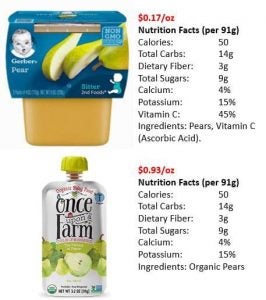As parents, we all want what’s best for our children — this is especially true for moms of young children. What we feed our children when they are young is something we take very personally. We want it to be the freshest, most nutritious food for our little ones, so that they can grow and thrive.
When I was pregnant with my daughter, I was going to be “that mom.” I had planned to breastfeed and make all of her pureed foods. That was until, at 38 weeks pregnant, I found out that at some point during the pregnancy she had suffered a stroke. All of my plans, hopes and dreams went out the window; we were in full survival mode. We didn’t even know if she would live. She was born the next day via c-section and was in the NICU for three weeks, during which she was fed via a feeding tube that went down through her nose and into her stomach. My plans of breastfeeding gave way to just hoping she’d be able to eat on her own someday.
Breastfeeding never worked out, but we were elated when she was able to drink from a bottle. I still wanted the absolute best for her, but the best isn’t always what the mommy blogs and Facebook ads portray. With all of the doctor and therapy appointments in addition to just figuring out how to take care of a baby that now had some pretty significant disabilities, making fruit and vegetable purees for her was not the best use of my time. I’ll admit it, I felt a bit of shame. I wondered if I should at least buy the more expensive organic purees to make up for the guilt I felt for not making the foods myself, so sometimes I did.
So, why did I tell you this story? Because companies, specifically baby food companies, take full advantage of this need we have as parents to provide the best for our children. If we don’t have the resources to make all of our baby’s food from scratch, then we want to buy whatever food is closest to homemade. Enter Jennifer Garner and her new cold pressed, organic, refrigerated baby food company, Once Upon a Farm. I first heard of this company when I was watching “The Ellen DeGeneres Show” a few weeks ago. There she was, telling the audience “Your baby’s food shouldn’t be older than your baby.” Cue eyeroll and subsequent Google search to figure out what this company was all about. There it is, right on the homepage, “As fresh as it gets without making it yourself.” Well, look at that. Organic and non-GMO too, of course, but we already know that those fear-based marketing labels don’t mean the products are any safer or more nutritious.
So, what’s the deal with this “cold pressed” process they’re touting? The process they are referring to when saying “cold pressed” is called High Pressure Processing (HPP), which is a cold pasteurization technique in which products that are already sealed in their final packaging are subjected to water pressure equivalent to five times the pressure at the deepest part of the ocean. Well, if that doesn’t sound homemade, I don’t know what does. They claim that this process doesn’t destroy as many nutrients as heat pasteurization, which is how the shelf stable baby foods are processed. However, HPP creates a less stable product, which is why they need to be refrigerated and only have a one to two week shelf life, whereas heat pasteurized baby foods have a shelf life of several months.
Around the same time, I began seeing ads on Facebook for another cold pressed baby food company called “Little Spoon.” One of their ads said the following:
“Other baby food uses preservatives and extreme heat to cook the food, destroying key nutrients and leaving you with high levels of unnatural sugars and sodium.”
This ad really bothered me because it doesn’t even make sense and is the epitome of fearmongering. What is “unnatural sugar and sodium,” and how would heating a product create these things? It doesn’t, and when I called them out on Facebook, they apologized and said they had pulled the ad, which was created by a third party agency and should have never been posted. I appreciate their response and for pulling the ad, but how many people saw it and now believe this false nonsense?
I still wanted to know more about the validity of their claims that “cold pressed” baby foods are more nutritious than heat pasteurized baby foods. They sent me some studies, which showed that HPP preserved a few different nutrients in some different juices and a strawberry puree, however, there aren’t any studies that have been conducted on HPP vs. heat pasteurized baby foods. We also know that cooking foods can increase the bioavailability of certain nutrients, and HPP could potentially destroy certain nutrients that heat pasteurization doesn’t. When I questioned them about this lack of research, Little Spoon had the following response: “Being that baby food is a newer application for HPP there is not a body of research that exists as it does in other categories. We work with leading experts to ensure the quality and safety of our food. We are advocating with various industry and academic stakeholders to further the research of this category.”
I’m glad they are planning on doing the research, but I’m not sure how they can claim that their products are nutritionally superior without any evidence.
Another point that really bothers me about these “cold pressed” baby food companies is that their ads demonize “heat processing,” yet I assume they must be steaming the vegetables before pureeing them, so I questioned Little Spoon about it. Here’s what they had to say, “As far as cooking, we gently steam the ingredients that require cooking (like sweet potatoes) and keep raw the ingredients that don’t (like bananas and mango). We believe in our product and focus on delivering baby food that is safe, delicious and nutritious. In our opinion, the use of HPP allows us to retain organoleptic properties of the food like taste, texture and color, far better than those of commercially sterile, shelf-stable baby foods.” So, they do use a form of “heat processing” as well, which is the very thing they vilify. Maybe their foods do have better organoleptic properties, but that’s purely based on opinion, like they said. Let’s not forget, we’re talking about pureed baby foods. Do superior organoleptic properties of a baby puree really warrant a price five times that of shelf stable, heat pasteurized baby food? I guess that’s for the consumer to decide.
Here’s a comparison of a heat pasteurized, shelf stable Gerber pear puree vs. a HPP Once Upon a Farm pear puree.

Well look at that, they are exactly the same nutritionally, except the heat treated product even has some added vitamin C!
Parents have enough things to worry about, let’s not let fear-based marketing create more worry. These companies know exactly what they’re doing, and they very effectively employ an appeal to our emotions as parents to want do what’s best for our kids. They create doubt around perfectly safe and healthy products, in this case heat-pasteurized baby foods, in order to create a market to shame us into spending more for a product that really isn’t nutritionally superior. Can we get some perspective here? We are talking about fruits and vegetables. Regardless of the process used to prepare them they are healthy and great for our children to eat.
Food Science Babe is the pseudonym of an agvocate and writer who focuses specifically on the science behind our food. She has a degree in chemical engineering and has worked in the food industry for more than decade, both in the conventional and in the natural/organic sectors.



